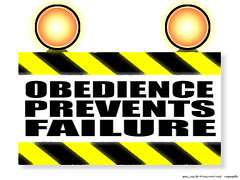Do Canadians Lack Discipline?
Yesterday, a friend of mine who came to Canada when he was in his twenties, told me that Canadian workers are lazy goof-offs.If it's true, not many newcomers would be surprised.
For, according to a recent article in The Toronto Star they think there's something wrong with the way Canadians raise their kids.
- Yang Bin was surprised by what she saw when she walked her two-year-old granddaughter Sophia Jiang into a family drop-in program...
"Kids just run around and play," said the 65-year-old retired university professor... They are free to do whatever they want. Kids growing up in the West need more discipline.
Parenting is about teaching kids to respect their authorities, so they learn the traditional values and know how to behave properly."....
[Kenise Murphy Kilbride, an early childhood education professor at Ryerson University] said studies have shown that immigrant parents disapprove of their children questioning parental authority.
"They could not understand how `Canadian' parents can tolerate public tantrums of their children and think that the Canadian law prohibiting physical punishment restricts their ability to discipline their children," she added.
Yang...agrees. "In China, we tend to be more restrictive to our children and grandchildren. We spank them when they misbehave... You don't give them choices. You tell them what to do."
- The Afghani way of life is very different from the Canadian way of life. Out of respect, there is always a distance between children and their parents. There's no emotional support, no display of emotions, because parents are afraid that'd lessen their authority over their children.
But, I wonder about the relationship between child-rearing and productivity. Is there a relationship between them?
Martin Seligman claims that the power to make and follow through on one's own decisions from an early age is a great boon to a healthy personality. In The Optimistic Child, he writes:
- The more we make decisions (good or bad) the more we feel in control, the more competent we feel, the more self-esteem we have.
So, again, what is the relation between child-rearing and economic productivity? A search on Google provided no quick answers. Perhaps because there are none.
George Jonas wrote an interesting column about saying "No" to children. It doesn't address productivity directly but it does imply that the issue is not a simple one. Here is an excerpt:
- About 15 years ago, a friend made a pedagogical observation:
"Why should I say no to my daughter when she keeps kicking the table?" he said. "Should I stop her just because it annoys me?"
My friend had a whole zoo of kids... They... interrupted everyone, demanded centre stage, and went into hysterics when -- all too rarely -- their desires were frustrated... My friend's kids may have wanted a very firm hand indeed, but as he gave them none, they became little monsters...
He implied that adults who impose limits on children do it just for their own convenience. He tried to suggest that restrictions were senseless, and served merely to stifle a child.
In making this suggestion my friend echoed a school of pedagogical thought that achieved near-domination among North America's middle-class parents.
The thesis held that... any moulding would suppress a child's spontaneity, creativity and self-confidence. It would risk turning him into a mindless conformist or an inhibited bundle of neuroses.
Saying no to a child who does something annoying serves at least three purposes beneficial both to the child and to society.
First, it habituates the child to obey the parent. Parents, on the whole, have more life experience than their children...
Second,.... shedding infantile selfishness is the basis of any social life, and it's doubtful if children can shed it without some training...
Third, a "no"... accustoms him to the idea that things don't accrue to him by right, and that in order to get something (say, approval) he'll have to give something in return....
Fifteen years have passed...and the table-kicking little monsters...have grown into young men and women. First question: How did they turn out?
Answer: Splendid, I'm happy to report, as well (if not better) than kids of stricter upbringing.
Second question: Has this caused me to change my mind about raising children? Answer: Not a bit.


No comments:
Post a Comment